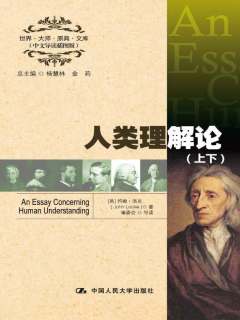哲学与宗教
类型
可以朗读
语音朗读
1584千字
字数
2012-09-01
发行日期
展开全部
主编推荐语
本书是洛克关于经验论的哲学著作,探究了知识的性质和人类探究真理的能力。
内容简介
本书向读者详细和系统地论述了人类的理解活动(即理智和心智活动),阐释了我们为何可以逐步获得我们能够获得的知识,并以此形成我们的信仰;以及为何我们不可避免地对知识的认知是有限度的;以及为何我们的知识是可以增进的(尽管我们对知识的认知有限度)。
目录
- 版权信息
- 人类理解论(上)
- Chronology
- The Epistle Dedicatory
- The Epistle to the Reader
- BOOK I: Of Innate Notions
- Chapter I Introduction
- Chapter II No Innate Principles in the Mind
- Chapter III No Innate Practical Principles
- Chapter IV Other Considerations concerning Innate Principles, both Speculative and Practical
- BOOK II: Of Ideas
- Chapter I Of Ideas in General, and their Original Chapter II Of Simple Ideas
- Chapter II Of Simple Ideas
- Chapter III Of Ideas of One Sense
- Chapter IV Of Solidity
- Chapter V Of Simple Ideas of Divers Senses
- Chapter VI Of Simple Ideas of Reflection
- Chapter VII Of Simple Ideas of both Sensation and Reflection
- Chapter VIII Some further Considerations concerning our Simple Ideas
- Chapter IX Of Perception
- Chapter X Of Retention
- Chapter XI Of Discerning, and other Operations of the Mind
- Chapter XII Of Complex Ideas
- Chapter XIII Of Simple Modes; and first, of the Simple Modes of Space
- Chapter XIV Of Duration, and its Simple Modes
- Chapter XV Of Duration and Expansion, considered together
- Chapter XVI Of Number
- Chapter XVII Of Infinity
- Chapter XVIII Of other Simple Modes
- Chapter XIX Of the Modes of Thinking
- Chapter XX Of Modes of Pleasure and Pain
- Chapter XXI Of Power
- Chapter XXII Of Mixed Modes
- Chapter XXIII Of our Complex Ideas of Substances
- Chapter XXIV Of Collective Ideas of Substances
- Chapter XXV Of Relation
- Chapter XXVI Of Cause and Effect, and other Relations
- Chapter XXVII Of Identity and Diversity
- Chapter XXVIII Of other Relations
- Chapter XXIX Of Clear and Obscure, Distinct and Confused Ideas
- Chapter XXX Of Real and Fantastical Ideas
- Chapter XXXI Of Adequate and Inadequate Ideas
- Chapter XXXII Of True and False Ideas
- Chapter XXXIII Of the Association of Ideas
- 人类理解论(下)
- BOOK III:Of Words
- Chapter I Of Words or Language in General
- Chapter II Of the Signification of Words
- Chapter III Of General Terms
- Chapter IV Of the Names of Simple Ideas
- Chapter V Of the Names of Mixed Modes and Relations
- Chapter VI Of the Names of Substances
- Chapter VII Of Particles
- Chapter VIII Of Abstract and Concrete Terms
- Chapter IX Of the Imperfection of Words
- Chapter X Of the Abuse of Words
- Chapter XI Of the Remedies of the foregoing Imperfections and Abuses
- BOOK IV:Of Knowledge and Opinion
- Chapter I Of Knowledge in General
- Chapter II Of the Degrees of our Knowledge
- Chapter III Of the Extent of Human Knowledge
- Chapter IV Of the Reality of Knowledge
- Chapter V Of Truth in General
- Chapter VI Of Universal Propositions, their Truth and Certainty
- Chapter VII Of Maxims
- Chapter VIII Of Trifling Propositions
- Chapter IX Of our Knowledge of Existence
- Chapter X Of our Knowledge of the Existence of a God
- Chapter XI Of our Knowledge of the Existence of other Things
- Chapter XII Of the Improvement of our Knowledge
- Chapter XIII Some further Considerations concerning our Knowledge
- Chapter XIV Of Judgment
- Chapter XV Of Probability
- Chapter XVI Of the Degrees of Assent
- Chapter XVII Of Reason
- Chapter XVIII Of Faith and Reason, and their Distinct Provinces
- Chapter XIX Of Enthusiasm
- Chapter XX Of Wrong Assent, or Error
- Chapter XXI Of the Division of the Sciences
- 导读
展开全部
出版方
中国人民大学出版社
中国人民大学出版社成立于1955年,是新中国建立后成立的第一家大学出版社。时光在文字与光阴中驻足,我们在积聚书香与赓续文脉之时,也有一点小小的向往,在徜徉中拢住自我与他者的目光,给天下读书人一点点温暖。

